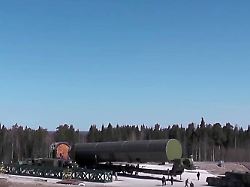Duma clears the way
Russia can test nuclear weapons again
October 19, 2023, 7:57 a.m
It has been 33 years since Russia last tested nuclear weapons. Soon it could be that time again, at least theoretically. The Duma withdraws its ratification of the ban treaty. Putin’s signature is expected to follow shortly.
For the first time in decades, Russia will be able to test nuclear weapons in the future. The lower house of parliament, the State Duma in Moscow, unanimously passed in second and third final readings a law withdrawing Russia’s ratification of the Global Nuclear-Test-Ban Treaty (CTBT). The country is thus withdrawing from another international security treaty. The reason for this was anger at the lack of steps in the USA. The third reading of the law was originally scheduled for Thursday. Approval by the Federation Council, the upper house of parliament, is considered a formality.
Kremlin chief Vladimir Putin is now expected to quickly formalize the decision with a signature. This means that Russia will soon be able to test nuclear weapons again – for the first time since the collapse of the Soviet Union. The last nuclear weapons test to date dates back 33 years and took place on October 24, 1990.
The executive secretary of the CTBT organization in Vienna, Robert Floyd, regretted the Russian move. “This decision contradicts the new global determination to bring the CTBT into force,” he said. 178 states have ratified the treaty. To enter into force, ratification by eight states, including the USA, China and Israel, is missing.
Withdrawal from several disarmament treaties
Putin justified the withdrawal of ratification by saying that Russia must have the same options as the second major nuclear power, the USA. Washington can test nuclear weapons at any time since it never ratified the CTBT. MPs stressed that Moscow had waited more than 20 years for Washington to ratify the treaty. Action is now being taken to establish the strategic balance and to do everything possible to protect Russian citizens, said parliamentary leader Vyacheslav Volodin.
In the conflict with the USA, Russia withdrew from several disarmament treaties – partly in response to steps taken by the USA. Last year, Putin completed Russia’s withdrawal from the Conventional Armed Forces in Europe Disarmament Treaty (CFE Treaty) and suspended the last major nuclear disarmament treaty, New Start, with the United States. In 2021, the Kremlin chief sealed the withdrawal from the Open Skies contract for international military observation flights. That was a response to the US withdrawal. In 2019, the INF Treaty was terminated to ban land-based short- and medium-range nuclear missiles.
“Only if the USA tests”
According to official information, Russia only wants to test nuclear weapons in the future if the USA also does so. Russia is repeatedly testing nuclear-capable intercontinental ballistic missiles and a variety of other new weapons, although without nuclear warheads. Putin had also ordered that the test sites be prepared for possible testing of nuclear weapons. In the conflict with the USA and NATO over Ukraine, he also put the country’s nuclear weapons on heightened alert.
The Nuclear Test Ban Treaty was passed in 1996 to curb the further development of nuclear weapons. The global test ban has not yet come into force, but since the 1990s all states except North Korea have adhered to it. The CTBT organization in Vienna operates a global network of measuring stations that can detect nuclear tests using pressure waves as well as chemical and nuclear traces. Russia wants to continue to provide data from its own 32 stations.
